Related Research Articles
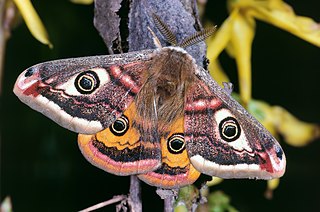
Saturniidae, members of which are commonly named the saturniids, is a family of Lepidoptera with an estimated 2,300 described species. The family contains some of the largest species of moths in the world. Notable members include the emperor moths, royal moths, and giant silk moths.
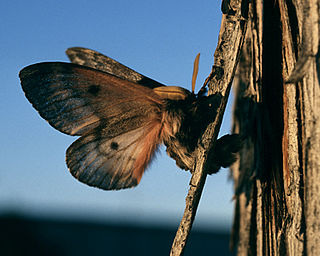
Coloradia is a genus of moths of the family Saturniidae. There are nine described species found in Mexico and eastern North America. The genus was first described by C. A. Blake in 1863.
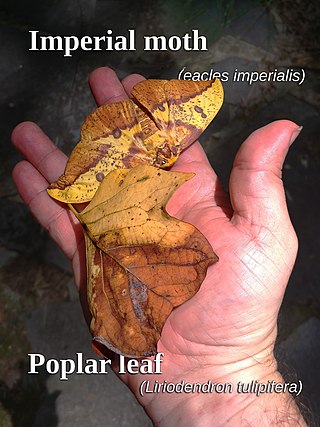
Eacles is a genus of moths in the family Saturniidae. They are native to the Americas. The genus was erected by Jacob Hübner in 1819.

Saturnia is a genus of large silkmoths in the family Saturniidae, which the German biologist Franz von Paula Schrank first described in 1802. Its members are commonly named emperor moths, though this is also used for various close relatives in subfamily Saturniinae. Most species are Palearctic, but three, commonly called "saturnia moths", inhabit the chaparral of California: S. mendocino, S. walterorum, and S. albofasciata.

The dryandra moth is a species of moth that is considered to be the sole member of the family Carthaeidae. Its closest relatives are the Saturniidae and it bears a resemblance to many species of that family, bearing prominent eyespots on all wings. The common name is derived from the Dryandra shrubs of the genus Banksia, on which the larva of this species feed, and is hence restricted to the south-west of Western Australia where these shrubs grow. Other Grevillea shrubs may also be used as host plants.

Caligula is a genus of moths of the family Saturniidae. It is primarily an Oriental genus, found in India, China and Southeast Asia. The genus is often treated as a synonym of Rinaca. It is named after Roman emperor Caligula.

Antherina is a monotypic moth genus in the family Saturniidae erected by William Elford Leach in 1815. Its only species, Antherina suraka, the Suraka silk moth, was first described by Jean Baptiste Boisduval in 1833. It is found on Madagascar and Mayotte. Both larvae and pupae consumed in parts of Madagascar, but not to a great extent. The larvae feed on oleander, privet, willows, beech, Liquidambar, Crataegus (hawthorns), grapevine, lilac, cherry, laurel, Forsythia, Rhus, Pistacia, apple, pear, plum and peach leaves, but foodplants differ from species to species. They start off black with yellow protrusions to eventually green with red and yellow on their bodies. Once they've finished growing they will be as thick as your finger and when they have reached their final days as a caterpillar they will develop a blue dorsal stripe and wander around looking for a place to pupate.
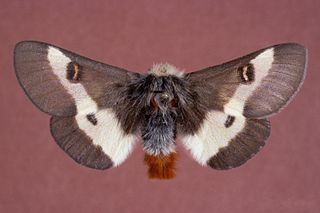
Hemileucinae is a subfamily of the family Saturniidae, including a number of taxa whose caterpillars have venomous urticating hairs.
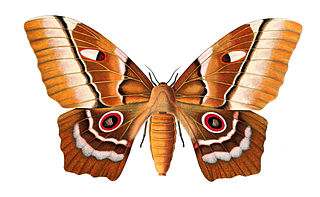
Pseudimbrasia is a monotypic moth genus in the family Saturniidae described by Pierre Claude Rougeot in 1962. Its only species, Pseudimbrasia deyrollei, described by James Thomson in 1858, is found in the mid-latitudes of Africa.

Automeris is a genus of moths in the family Saturniidae and the subfamily Hemileucinae. As of 1996 there were 124 species, and more have since been described. These moths are generally characterized by the eyelike patches on the hindwings and the leaflike pattern on the forewings, an example of crypsis. The genus was first described by Jacob Hübner in 1819 and it is distributed in the Neotropical realm.
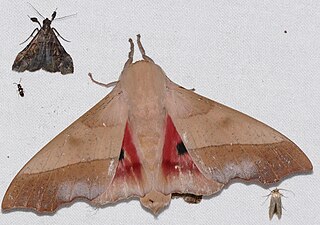
Syssphinx is a genus of moths of the family Saturniidae. The genus was erected by Jacob Hübner in 1819.

Aglia is a genus of moths in the family Saturniidae first described by Ochsenheimer in 1810. It is the only genus in the subfamily Agliinae.

Copiopteryx is a genus of moths in the family Saturniidae first described by James Duncan and John O. Westwood in 1841.

Microdulia is a genus of moths in the family Saturniidae first described by Karl Jordan in 1924. It contains only one species, Microdulia mirabilis, described by Rothschild in 1895, which is found between 35° and 47°S in Chile and Neuquén in Argentina.

Hemileuca is a genus of moths in the family Saturniidae first described by Francis Walker in 1855.
Hypermerina is a genus of moths in the family Saturniidae. The genus was erected by Claude Lemaire in 1969.

Salassa is a genus of moths in the family Saturniidae. It is the only genus in the subfamily Salassinae.

Hyalophora is a genus of moths in the family Saturniidae. The genus was erected by James Duncan and John O. Westwood in 1841.

Samia is a genus of moths in the family Saturniidae. The genus was erected by Jacob Hübner in 1819.
Antistathmoptera is a genus of moths in the family Saturniidae first described by Tams in 1935.
References
- ↑ Rougerie, R. & Collective of iBOL Saturniidae expert taxonomists (2009). "Online list of valid and available names of the Saturniidae of the World". Lepidoptera Barcode of Life: Saturniidae.